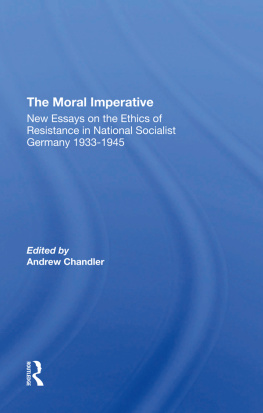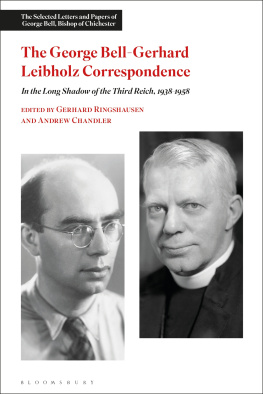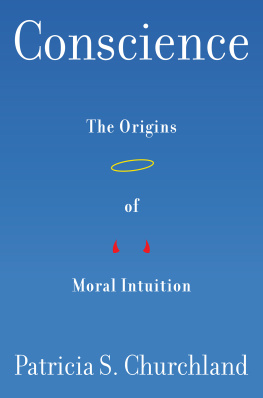The Moral Imperative
Widerstand: Dissent and Resistance in the Third Reich
Andrew Chandler, Series Editor
The Moral Imperative: New Essays on the Ethics of Resistance in National Socialist Germany, 19331945, edited by Andrew Chandler
American Intelligence and the German Resistance to Hitler A Documentary History, edited by Jrgen Heideking and Christof Mauch
The Flame of Freedom: The German Struggle Against Hitler, Eberhard Zeller
The Von Hassell Diaries: The Story of the Forces Against Hitler Inside Germany, 19381944, Ulrich von Hassell
The Secret War Against Hitler, Fabian von Schlabrendorff
Conscience in Revolt: Sixty-Four Stories of Resistance in Germany, 193345, Annedore Leber
First published 1998 by Westview Press
Published 2019 by Routledge
52 Vanderbilt Avenue, New York, NY 10017
2 Park Square, Milton Park, Abingdon, Oxon OX14 4RN
Routledge is an imprint of the Taylor & Francis Group, an informa business
Copyright 1998 by Taylor & Francis
All rights reserved. No part of this book may be reprinted or reproduced or utilised in any form or by any electronic, mechanical, or other means, now known or hereafter invented, including photocopying and recording, or in any information storage or retrieval system, without permission in writing from the publishers.
Notice:
Product or corporate names may be trademarks or registered trademarks, and are used only for identification and explanation without intent to infringe.
A CIP catalog record for this book is available from the Library of Congress.
ISBN 13: 978-0-367-29413-7 (hbk)
Dedicated to the memory of George Kennedy Allen Bell Bishop of Chichester 19291958 Friend and advocate of those who resisted National Socialism in Germany, 19331945
Contents
Andrew Chandler
John S. Conway
Beate Ruhm von Oppen
Klemens von Klemperer
Klaus-Jrgen Mller
Peter Hoffmann
Ursula Bttner
Guide
The six essays published here were given at the conference, Christianity and Resistance: National Socialist Germany 19331945, in the Barber Institute of Fine Arts at the University of Birmingham on 1923 April 1995. It is worthwhile to place them in that context, and also important to thank those who contributed to the occasion in other ways. This was an international gathering of one hundred scholars and students, public servants and private citizens, and its main purpose was to encourage a discussion of the significance of the subject from a variety of different angles. The conference was inaugurated by the General Secretary of the World Council of Churches, Dr. Konrad Raiser, and closed by a speech by Professor the Baroness Williams of Crosby. The sessions were chaired by Eberhard and Renate Bethge and the Rt. Revd John Austin, bishop of Aston, the diplomats Sir Julian Bullard and Dr. Peter Hermes, Professor Jeremy Noakes of the University of Exeter and Professor John A. S. Grenville of the University of Birmingham. On the first day Grfin Marion Dnhoff and Christabel Bielenberg shared their experiences and insights in a public dialogue. On the last day the Rt. Hon. Frank Field M.P. (now minister of state for Social Security) lectured on the legacy of the bishop of Chichester, George Bell. Discussions were chaired by Dr. Lothar Kettenacker of the German Historical Institute in London, the Rt. Revd Professor Peter Selby (now bishop of Worcester), Professor W. R. Ward, Professor F. Burton Nelson of North Park Theological Seminary, Chicago and Professor Geffrey Kelly of La Salle University, Philadelphia, the Revd Canon Paul Ostreicher of Coventry Cathedral, the Revd. Martin Hneke and the Revd. Canon Hugh Searle of the International Bonhoeffer Society, the Revd. Dr. Keith Clements (now General Secretary of the Conference of European Churches), the Revd. Canon Alan Wilkinson of Portsmouth Cathedral and the Rt. Revd Anthony Dumper and Professor Klemens von Klemperer. Concerts by the Rose String Quartet, Philip Fisher (Piano), Roy Theaker (violin) and Vivian McLean (piano) took place in the evenings. The conference concluded with a eucharist at Birmingham Cathedral on the fiftieth anniversary of the deaths of Klaus Bonhoeffer, Rdiger Schleicher, Hans John, Hans Ludwig Sierks, Carl Adolf Marks, Friedrich Justus Perels, Wilhelm zur Nieden and Richard Klenzer on 223 April 1945. The president and preacher was the Rt. Revd. Mark Santer, bishop of Birmingham.
Both before and during the meeting I was generously supported by an organizing committee of Sally Bateman, Doreen Brandreth, Anita Guy, Jonathan Hazlett, Barbara Richardson and Christopher Sleight. I owe a particular, and inestimable debt of gratitude to Eric Adams.
The task of editing this book has taken more time than I at first believed and hoped. I am most grateful to Doreen Brandreth and Roger Smith for their kind advice in practical matters, and to my wife, Fiona, for her support throughout.
Andrew Chandler
George Bell Institute
The Queens College
Birmingham
1 September 1997
1
Introduction
Andrew Chandler
Historiography and Terminology
This book explores a number of the moral codes which inspired, justified and sustained the resisting conscience in the Third Reich. Six historians trace their expressions in a world of action and seek to relate them to the cultural and institutional realities of a totalitarian state. But it is necessary at the outset to sound a note of caution. Historians are now more than ever conscious that the subject of resistance in Hitlers Germany presents a dense tapestry of diverse experiences which often leaves them grasping for a common language of analysis and interpretation, and which defies clear patterns or forms.War in which German support was vital to the old enemies of National Socialism, cast a long shadow.
In time a new generation of scholars began to search for what would seem stronger models of analysis. A suspicion now hung in the air that too heavy an emphasis on morality tended to cloud important issues. The world of resistance required subtler approaches, not least to clarify what at times appeared to be an inextricable relationship between assent and criticism, complicity and opposition. The work of Hans Mommsen placed a new stress on the political and constitutional designs of what was increasingly called the conservative-national resistance. He found them to be sympathetic not to the values of liberal democracyas defined in either the constitutions of Weimar or the later Federal Republicbut to the authoritarianism of Wilhelmine days. Moreover, their sense of Germanys status in Europe looked uncomfortably hegemonic.
As the interpretations of political historians shifted, the term resistance itself fractured. In Germany the work of the Bayern-Projekt of Martin Brozsat in Munich began to explore a complex and subtle world of Resistenz. This encompassed the complaints, gossip, dissociations and obstructions of ordinary men and women. The moral character of resistenz was not so explicit. Pragmatism, self-interest, and even malice, inspired the dissenting act. Friendshipor hatredwas for many more important than the appeal to principle. Brozsat widened the boundaries of the subject, almost to the point whereby definition of any kind was difficult. The words Widerstand (resistance), Opposition or Widerspruch (opposition), Protest (protest), Dissens (dissent), Verweigerung (refusal to co-operate, and Umsturz (revolt) have all embraced, in the hands of different writers, a variety of responses to the Hitler state. Today there is little reason to think that a watertight system of definitions is feasible. The most that an individual historian can do is to construct a personal framework of terms to clarify and separate these different counter-movements and make possible a more self-aware analysis and debate.








